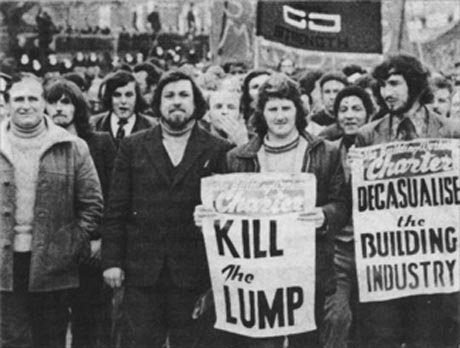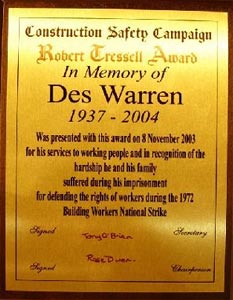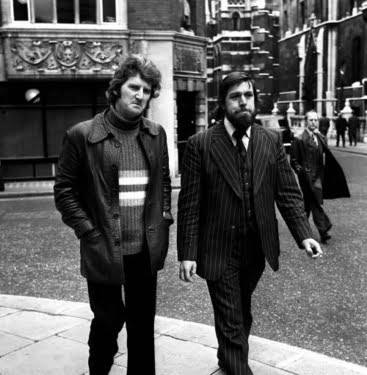This Saturday July 4th trade unionists and labour movement activists will be converging in Shrewsbury to march for justice for the Shrewsbury 24. Speakers at the lunchtime rally outside the Shrewsbury Council Offices will include Ricky Tomlinson, speakers from the PCS and the campaign itself.
The show trial of pickets who had been involved in the 1971 building sites stoppage remains one of the most shamefull abuses of so-called British justice. One of those involved, the late Des Warren said some years later: "The Shrewsbury trials and jailings were Act One in the ruling class onslaught against trade union rights throughout the 1970s and now into the 1980s with Thatcher’s Tory government giving huge pay rises to the judiciary, police, regular army and reservists, coinciding with proposals to outlaw secondary picketing, weaken the closed shop, cut so-called security to strikers’ families, and other measures." Sadly, many of these anti-union measures are still in place despite over a decade of Labour in power. It has been left to the likes of the Lindsey workers to show how these laws can be pushed to one side by the power of organised labour.
In this extract from Rob Sewell’s 2003 book on the history of British trade unionism, he describes the background to the case of the Shrewsbury 24.
FROM: ‘In The Cause Of Labour’ by Rob Sewell 2003 (Wellred Books)
 1972 saw not only the first official miners’ strike but also the first
1972 saw not only the first official miners’ strike but also the first
official building workers’ strike since the 1920s. Building workers, whose
separate unions merged to form the Union of Construction, Allied Trades and
Technicians (UCATT) in 1971, staged their national stoppage for 30 for a
35-hour week, and for the abolition of lump (self-contract) labour. The 13-week
strike resulted in increased union organisation and the biggest single rise ever
negotiated in the building industry. Again, the key weapon in this struggle was
the use of flying pickets that toured around the construction sites ensuring the
strike was solid.
The Tory government was desperate to contain the situation and stop the mass
picketing. They decided to achieve this by making an example of those guilty of
mass picketing, by framing them on charges of intimidation, violence and
conspiracy. They hoped this would stop the militant workers and act as a
deterrent to others. As a consequence arrests were made of two-dozen leading
building workers in the North Wales area. The trial of the "Shrewsbury 24", as
it was called, was a political trial. It was a deliberate conspiracy of the
Employers’ Federation, government and state, to frame the men and demonstrate to
everyone that militancy does not pay.
"I have heard the judge say that this was not a political trial, just an
ordinary criminal case, and I refute that with every fibre of my being"
stated one of the accused, Ricky Tomlinson. "I look forward to the day when the
real culprits, the McAlpines, the Wimpeys, the Laings and the Bovis’ and their
political bodies are in the dock facing charge of conspiracy to intimidate
workers from doing what is their lawful right picketing."
Des Warren was just as defiant.
"Mr Bumble said ‘The law is an ass’. If he were here now he might draw the
conclusion that the law is quite clearly the instrument of the state to be used
in the interests of a tiny minority against the majority."
In the end, six men were found guilty in the capitalist courts of unlawful
assembly and three of affray. On appeal, the charge of affray was quashed.
McKinsie Jones, Des Warren, and Ricky Tomlinson were found guilty of conspiracy.
The latter got nine months, three years and two years respectively. In the
subsequent trials, pressure was brought on defendants to plea guilty to unlawful
assembly to avoid the charge of conspiracy. Some accepted the deal, while others
steadfastly refused. Brian Williams, Arthur Murray and Mike Pierce were
subsequently found guilty on unlawful assembly and affray and were given
sentences of six months and four months concurrent.
In the last of the trials, Terry Renshaw, John Seaburg and Lennie Williams
again refused to plead guilty to unlawful assembly. Seaburg was found guilty on
both charges and got suspended sentences of six and four months, while Renshaw
and Williams were found guilty of unlawful assembly and given suspended
sentences of four months. These were class laws passed against those who
challenged the employers and their state, every much as those against the
Tolpuddle Martyrs or the Glasgow spinners. Now as then, the spirit of these men
was not broken.
 Des Warren wrote optimistically from his prison cell:
Des Warren wrote optimistically from his prison cell:
"I was greatly encouraged by the sentiments expressed in it as in all the
other messages of support my family and myself have received from comrades and
fellow workers from all over the country. I tend to be something of an optimist
and so tend to put setbacks such as the position Mac Jones, Eric Tomlinson, me
and our families find themselves in, in their right perspective and gauge them
against the advances made."Through their attack on the trade union movement and workers’ reaction to
it, in the form of ‘Free the Three’ campaign, new links, contacts and
friendships have been made and unity is being formed as with the miners’ fight,
which will last until long after we are out of prison and which will stand the
movement in good stead in the continuing struggle, for these reasons I believe
our time in prison will not have been in vain and I look forward to my day of
release so that I can rejoin that struggle, not with a feeling of bitterness or
revenge but with a strengthened resolve to help bring about a socialist Britain."
Scandalously, despite the campaign of protests, Warren and Tomlinson were
left to serve the remainder of their prison sentence under a new Labour
government, which came to power in February 1974. The Labour Home Secretary, Roy
Jenkins (who crossed the floor and ended up as a Lord) refused to "compromise
the law of the land". Ricky Tomlinson was released on 25 July 1975. Des Warren
was then left isolated in prison. At the end of his sentence Des Warren served
six months in solitary confinement, was reported on 36 occasions by prison
officers and moved 15 times through ten different prisons.
Maltreatment in prison undermined Warren’s health and destroyed his family
life. Tragically, he contracted Parkinson’s disease. Such was the pressure on
Warren and his family that in February 1976 his wife Elsa suffered a nervous
breakdown and their five children were taken into care. The stress finally
resulted in a family break-up and eventual divorce. Today, Des resides at home
in the North East, crippled by illness, and remarried to his former carer Pat.
The last time Des Warren appeared in public was three years ago at the Durham
miners’ gala, but since then his health has continued to deteriorate. The
expense of his care was met by a trust fund set up by the Durham miners’
mechanics and the Wear Valley and District Trades Council. Eric Tomlinson, who
was blacked for his union activities, subsequently became famous as a result of
his acting career, but remains true, now as then, to the cause of trade unionism
and the working class.
 In 2004 Des lost his fight for life – he will not be forgotten.
In 2004 Des lost his fight for life – he will not be forgotten.
Order this book at a special price by clicking here.






